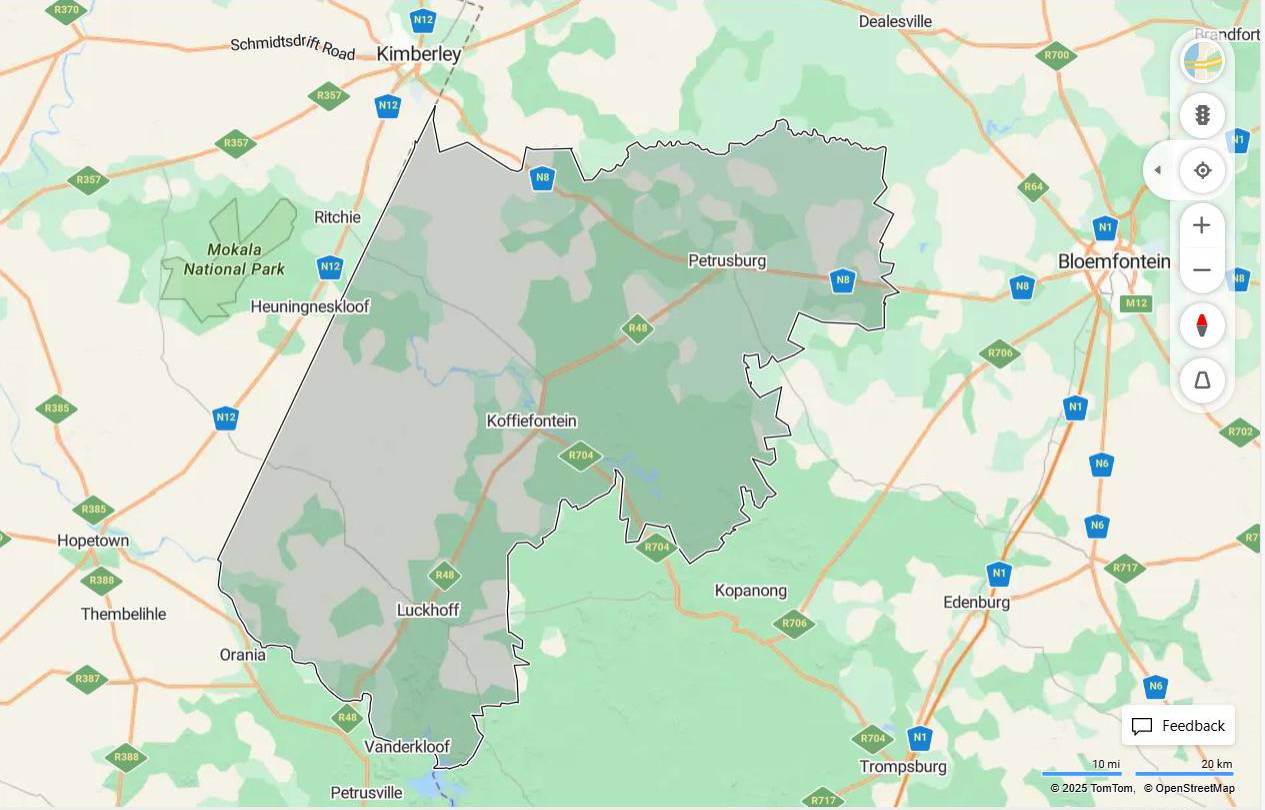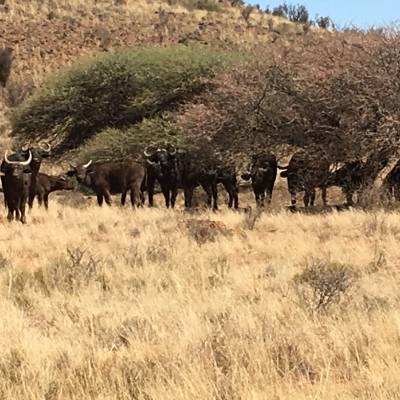Kalema Game and Cattle Ranch
PROJECT NAME / SITE:
Kalema Game and Cattle Ranch
--------------------------------------------------------
Business Owner(s):
Lefa Samuel Tsamaelator (Sole Beneficiary)
--------------------------------------------------------
Business Registration Number
Kalema Farming Trust (Registration Pending)
--------------------------------------------------------
Business Address
Koffiefontein Area, Free State Province, South Africa
--------------------------------------------------------
Business & Social Media Links
To be established upon investment
When was your business established?
2020 (Initial farming operations)
2025 (Agritourism development phase)
Sector
Agribusiness – Integrated Agritourism and Wildlife Management
Current Investment Sought
R50,000,000 for infrastructure development and operational enhancement
Use of Funds
Infrastructure development (70%), equipment and furnishing (16%), working capital (8%), professional services (6%)
Expected ROI
15-20% annually with projected revenue growth from R10.7 million (Year 1) to R31 million (Year 5)
--------------------------------------------------------
Environment
- Habitat Restoration
- Carbon Offset
- Water Conservation
- Zero-Waste Operations
--------------------------------------------------------
Social Impact
- Skills Development
- Community Integration
- Cultural Preservation
- Educational Partnerships
DESCRIPTION OF THE KALEMA GAME AND CATTLE RANCH
The agritourism industry within South Africa operates within an exceptionally dynamic and rapidly expanding global market environment that is characterised by steadily increasing consumer demand for authentic, sustainable travel experiences that connect visitors meaningfully with agricultural heritage and rural community life. The global agritourism market demonstrates remarkable growth potential, with comprehensive projections indicating substantial expansion from USD 8.10 billion in 2024 to unprecedented levels at a compound annual growth rate of 11.9% from 2025 to 2030, driven by a remarkable convergence of factors that appeal strongly to both domestic and international travellers who actively seek authentic rural experiences beyond conventional tourism offerings.
South Africa's comprehensive agricultural sector, valued at USD 16.03 billion in 2024 and confidently expected to reach USD 25.02 billion by 2030 at a sustained compound annual growth rate of 7.6%, provides an exceptionally robust foundation for agritourism development initiatives across diverse geographic regions. The country's extraordinarily diverse agricultural economy, ranging from dry conditions characteristic of the Karoo region to sub-tropical environments along the east coast and Mediterranean-style climates in the western regions, successfully supports comprehensive production encompassing major grains, deciduous and subtropical fruits, various oilseeds, sugar cultivation, nuts, citrus fruits, flowers, wine production, and virtually all vegetable varieties suitable for both domestic consumption and international export markets.
The industry benefits tremendously from increasing global consciousness regarding sustainable tourism practices, environmental stewardship, and authentic cultural exchange opportunities, providing visitors with meaningful insights into local agricultural traditions and rural community life. Contemporary travellers increasingly seek experiences that offer educational value, environmental responsibility, and genuine connection with local communities, creating ideal conditions for sophisticated agritourism operations that deliver authentic experiences while maintaining high service standards and environmental sustainability practices.
Mission Statement:
To create exceptional agritourism experiences that authentically showcase South African farming heritage whilst delivering sustainable economic returns to all stakeholders and providing meaningful employment opportunities to local communities, thereby positioning Kalema Game and Cattle Ranch as the premier destination for authentic agricultural tourism throughout the Free State region and establishing benchmark standards for integrated agritourism operations across southern Africa.
Vision Statement:
To establish Kalema Game and Cattle Ranch as South Africa's leading integrated agritourism destination, recognised internationally for excellence in sustainable farming practices, comprehensive wildlife conservation programmes, luxury hospitality service delivery, and authentic cultural experiences that celebrate and preserve the rich heritage of the Free State's agricultural landscape whilst contributing meaningfully to rural economic development and environmental conservation initiatives.
Legal Form of Business:
The enterprise operates as a Private Trust structure through the Kalema Farming Trust, which has been specifically designed to optimise tax efficiency whilst enabling flexible profit distribution mechanisms that can accommodate various investor participation models. This sophisticated structure facilitates future corporate restructuring opportunities for potential investor participation while providing comprehensive asset protection for farming operations and tourism infrastructure investments. The trust structure also enables efficient management of multiple business activities under a unified legal framework whilst maintaining operational flexibility for future expansion and development initiatives.
Traction:
- 8,400 hectares of prime agricultural land (owned)
- 130 hectares under irrigation producing maise, sunflower, and wheat
- Established livestock operations across 1,000-1,500 hectares
- Game management area exceeding 1,500 hectares
- Strategic location with historical significance and minimal competition within 130 kilometres
- Member of the Professional Hunters Association and Game Rangers Association
The Problem
- South Africa's agritourism sector remains underdeveloped in rural areas, particularly in the southwestern Free State region
- Limited authentic agricultural tourism experiences combining working farms with luxury hospitality
- High unemployment in rural mining communities following mine closures
- Lack of integrated tourism offerings that showcase both agricultural heritage and wildlife conservation
Our Solution
Kalema Game and Cattle Ranch addresses these challenges by offering:
- Authentic agritourism experiences on a genuine working farm
- Integrated luxury accommodation, conference facilities, and wildlife experiences
- Comprehensive employment creation in an economically underserved region
- Preservation and celebration of regional historical heritage, including the Great Trek significance and diamond mining history
- Sustainable land use practices combining agriculture, wildlife management, and tourism
Our Products
Kalema Game and Cattle Ranch operates through diversified revenue streams designed to maximise land utilisation whilst providing comprehensive visitor experiences:
Accommodation Services:
- Luxury eco-lodges accommodating 60 guests
- Premium pricing of R4,500-R6,500 per person per night
- Conference and event facilities for corporate retreats and social celebrations
Hunting and Wildlife Experiences:
- Professional hunting packages (R7,500-R9,500 per hunter per day)
- Photographic safari experiences (R3,500-R4,500 per person per day)
- Wildlife breeding and conservation programmes
Conference and Event Hosting:
- Professional conference facilities (R25,000-R45,000 per day exclusive use)
- Wedding venues (R85,000-R150,000 per event)
- Corporate team-building programmes
Agricultural Operations:
- Crop production on 130 hectares of irrigated land
- Livestock breeding and sales
- Educational farm tours and experiences
Educational Tourism:
- School programmes and cultural experiences (R350-R450 per student)
- Day visitor programmes (R450-R650 per person)
- Agricultural heritage education initiatives
Market Analysis
Target Segments
International Eco-tourists (35% of revenue): Affluent visitors seeking authentic African experiences (average spending R25,000-R35,000 per visit)
Domestic Premium Leisure (25% of revenue): High-income South African families and couples (average spending R15,000-R25,000 per group)
Corporate and Conference Market (20% of revenue): Companies requiring unique venues (average spending R45,000-R85,000 per event)
Hunting Enthusiasts (15% of revenue): International and domestic hunters (average spending R75,000-R125,000 per package)
Educational Tourism (5% of revenue): Schools and cultural groups (average spending R8,500- R12,500 per group)
Market Size & Growth
- Middle East and Africa agritourism market: USD 485.1 million (2024), projected 9.3% CAGR to 2030
- South Africa is expected to register the highest regional growth rate
- Global agritourism market: USD 73.2 billion (2024), projected to reach USD 205.6 billion by 2033
Competitive Edge
- Unique geographic positioning with no direct competitors within 130 kilometres
- Authentic working farm operations providing credible agricultural experiences
- Historical significance of location (Great Trek heritage, diamond mining history)
- Diversified revenue model, reducing market risk
- Strategic location near the Orange River and the Northern Cape border
Business Model
Revenue Streams:
Accommodation Services (40-45% of total revenue): Luxury lodges and conference facilities
Hunting and wildlife (25-30%): Professional hunting and photographic safaris
Conference and Events (15-20%): Corporate meetings, weddings, and special events
Agricultural Operations (8-12%): Crop production and livestock sales
Educational Tourism (5-8%): Farm tours, school programmes, and cultural experiences
Unit Economics:
- Accommodation: 65% target occupancy generating R7.2-R12.5 million annually
- Hunting operations: Premium pricing with high gross margins (60-70%)
- Conference facilities: High-value events with minimal variable costs
- Agricultural base: Stable revenue foundation supporting authentic experiences
Operational History & Traction
Current Operations:
2020-2024: Established farming operations across 8,400 hectares
Agricultural Production: 130 hectares of irrigated cropland, 1,000-1,500 hectares of livestock grazing
Wildlife Management: Over 1,500 hectares designated for game breeding and hunting
Infrastructure: Existing farmhouse facilities and agricultural equipment valued at R8.5 million
Market Position:
- Member of the Professional Hunters Association of South Africa
- Member of the African Game Rangers Association
- Established relationships with local suppliers and agricultural cooperatives
- Strategic partnerships under development with tourism operators
Biodiversity and Conservation Priorities
Kalema's operations actively contribute to biodiversity conservation and ecosystem restoration:
Conservation Initiatives:
Habitat Restoration: Converting degraded agricultural areas to Indigenous wildlife habitats
Species Reintroduction: Restoring native wildlife populations historically present in the region
Sustainable Hunting Practices: Maintaining wildlife populations through professional management
Water Conservation: Implementing efficient irrigation, reducing consumption by 35%
Environmental Benefits:
Carbon Sequestration: Grassland restoration and strategic tree planting programmes
Soil Health Improvement: Rotational grazing and crop rotation practices
Renewable Energy: Comprehensive solar power installation reducing grid dependency
Waste Management: Comprehensive recycling and organic composting programmes
Biodiversity Impact:
Wildlife Corridors: 15% of the land is reserved for natural corridors supporting native species
Pollinator Conservation: On-site programmes supporting wild and domestic pollinators
Indigenous Flora: Reintroduction through intercropping and habitat restoration
Monitoring Programmes: Continuous biodiversity tracking with academic institutions
Expansion Strategy
Phase 1 - Infrastructure Development (Years 1-2):
- Construction of 60-bed luxury accommodation facilities
- Development of a 200-person conference centre
- Restaurant and recreational amenity development
- Professional hunting and wildlife viewing infrastructure
Phase 2 - Market Development (Years 2-3):
- International market expansion targeting Europe and North America
- Corporate partnership development for conference and event business
- Educational programme expansion with schools and universities
- Premium service offerings, including spa and recreational facilities
Phase 3 - Regional Leadership (Years 3-5):
- Establishment as the premier southwestern Free State agritourism destination
- Additional accommodation capacity development
- Regional tourism network leadership
- Franchise or management contract opportunities













